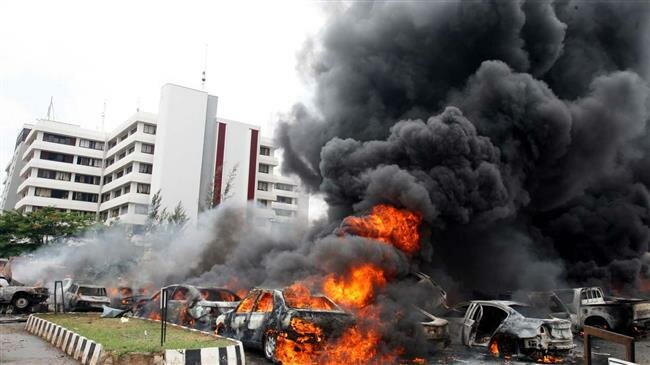(ABNA24.com) Local militia and residents said the attackers on three motorbikes opened fire on a group of men as they walked back from a funeral in Nganzai district near the state capital Maiduguri Sunday morning.
"Our men recovered 23 dead bodies from the scene of the attack, which happened this morning," local militia leader Bunu Bukar Mustapha told Agence France-Presse.
Boko Haram and its Daesh-supported ISWAP splinter have intensified attacks on civilian and military targets in recent months, despite the Nigerian government's insistence that the terrorists have been defeated.
Some observers allege that certain Nigerian officials are profiting from the unrest via corruption and have little interest in ending the bloodshed.
Rights groups have accused some Nigerian security forces of abuses in the fight against Boko Haram including extra-judicial killings and mass arrests.
The Nigerian government's failure to confront Takfiri terrorists contrasts with its heavy-handed crackdown on peaceful protests by supporters of prominent Shia cleric Sheikh Ibrahim al-Zakzaky who is held in jail despite the supreme court's order to release him.
Boko Haram militants attacked a camp for displaced people outside Maiduguri last Thursday, killing two residents and looting food supplies after burning a nearby military base.
Around 27,000 people have been killed in the decade-long Takfiri terrorism which has spilled over into neighboring Chad, Niger and Cameroon and forced more than two million people to flee their homes.
Boko Haram gained international notoriety in April 2014 when it kidnapped nearly 300 schoolgirls in the northern Nigerian town of Chibok.
While many schoolgirls have since been freed, countless other people abducted over the decade remain lost to their loved ones.
Suicide bombings and mass kidnappings are the hallmarks of Boko Haram in northeastern Nigeria, where many residents say life has been set back by decades.
Daesh, Boko Haram and other Takfiri terrorist groups are ideologically inspired by the Wahhabi school of thought which is openly promoted and practiced in Saudi Arabia.
Daesh-linked Boko Haram terrorists have attacked mourners returning from a funeral in Nigeria's restive northeast and killed at least 23 people.
Local militia and residents said the attackers on three motorbikes opened fire on a group of men as they walked back from a funeral in Nganzai district near the state capital Maiduguri Sunday morning.
"Our men recovered 23 dead bodies from the scene of the attack, which happened this morning," local militia leader Bunu Bukar Mustapha told Agence France-Presse.
Boko Haram and its Daesh-supported ISWAP splinter have intensified attacks on civilian and military targets in recent months, despite the Nigerian government's insistence that the terrorists have been defeated.
Some observers allege that certain Nigerian officials are profiting from the unrest via corruption and have little interest in ending the bloodshed.
Rights groups have accused some Nigerian security forces of abuses in the fight against Boko Haram including extra-judicial killings and mass arrests.
The Nigerian government's failure to confront Takfiri terrorists contrasts with its heavy-handed crackdown on peaceful protests by supporters of prominent Shia cleric Sheikh Ibrahim al-Zakzaky who is held in jail despite the supreme court's order to release him.
Boko Haram militants attacked a camp for displaced people outside Maiduguri last Thursday, killing two residents and looting food supplies after burning a nearby military base.
Around 27,000 people have been killed in the decade-long Takfiri terrorism which has spilled over into neighboring Chad, Niger and Cameroon and forced more than two million people to flee their homes.
Boko Haram gained international notoriety in April 2014 when it kidnapped nearly 300 schoolgirls in the northern Nigerian town of Chibok.
While many schoolgirls have since been freed, countless other people abducted over the decade remain lost to their loved ones.
Suicide bombings and mass kidnappings are the hallmarks of Boko Haram in northeastern Nigeria, where many residents say life has been set back by decades.
Daesh, Boko Haram and other Takfiri terrorist groups are ideologically inspired by the Wahhabi school of thought which is openly promoted and practiced in Saudi Arabia.

